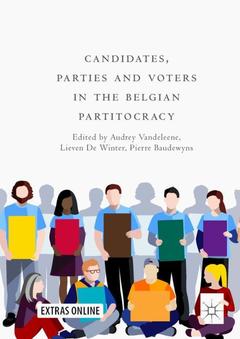1. Introduction. Candidates Between Parties and Voters: A Triadic Relationship in the Belgian Partitocracy
Audrey Vandeleene and Lieven De Winter
PART I: CANDIDATES’ BACKGROUND
2. The Effects of the Political Parties’ Selective Filter Bias on Descriptive Representation: Analysis of the Candidates’ Sociological and Political Background
Jérémy Dodeigne and Ferdinand Teuber
3. The More, the Smoother? Candidate Selection and Intraparty Competition
Audrey Vandeleene and Giulia Sandri
4. Who Wins More? Understanding Preferential Voting by Means of Context and Candidates’ Background and Campaigning
Marta Gallina, Stefano Camatarri and Maximilien Cogels
PART II: CAMPAIGNING
5. The Puzzle of Personalization of Politics: Evidence From Candidate Campaigns in Belgium 2007–2014
Lieven De Winter, Pierre Baudewyns and Maximilien Cogels
6. Campaigning and Candidates: Different Strategies for Different Candidates
Maximilien Cogels and Pierre Baudewyns
7. The Electoral Impact of Local Campaigning in the 2014 Regional and Federal Elections
Audrey André and Sam Depauw
PART III: POLICY CONGRUENCE
8. Constituting the List Amid Time of Personalization of Politics: The Balance of Congruent and Popular Candidates in Belgian Political Parties
Jérémy Dodeigne, Conrad Meulewaeter and Christophe Lesschaeve
9. Who Do You Feel and What Future Do You Want for Belgium? A Comparison of Candidates and Voters’ Identities and Institutional Preferences
Sophie Devillers, Pierre Baudewyns, Lieven De Winter and Min Reuchamps
10. From More or Less Integration to Status Quo? Explaining Candidates’ and Citizens’ Attitudes Towards European Integration
Samuel Defacqz, Jérémy Dodeigne, Ferdinand Teuber and Virginie Van Ingelgom
PART IV: REPRESENTATION AND DEMOCRACY
11. Between Parties and Voters: Candidates’ Role Conception in the Belgian Partitocracy
Chloé Janssen, Mihail Chiru and Lieven De Winter
12. Critical Candidates: Elite Attitudes Towards the Functioning of Representative Democracy
Christoph Niessen, Nathalie Schiffino, Vincent Jacquet and Ludovic Deschamps
13. Conclusion. Studying Candidates, Parties and Voters. Lessons Learned and New Questions
Audrey Vandeleene, Lieven De Winter and Pierre Baudewyns




